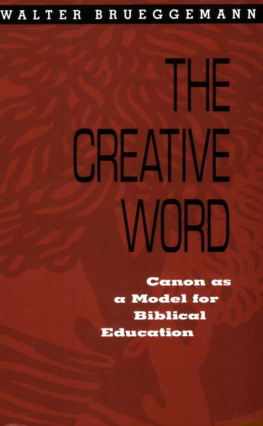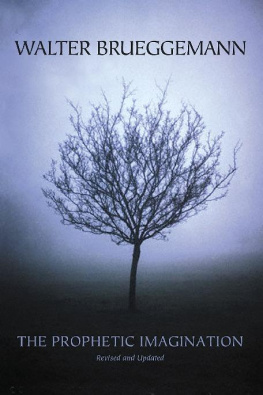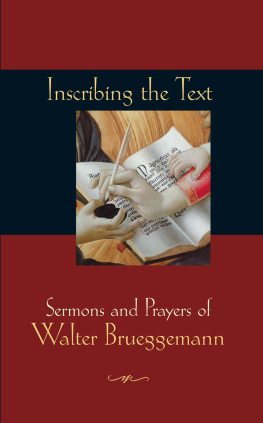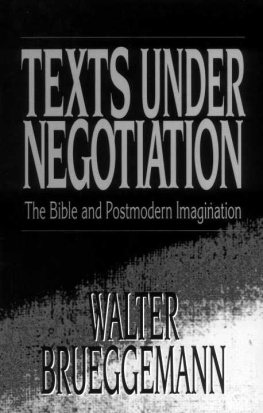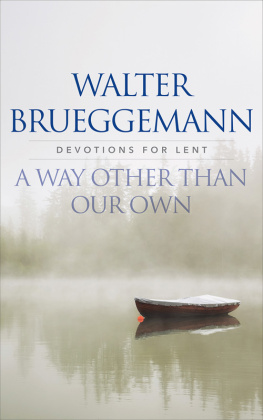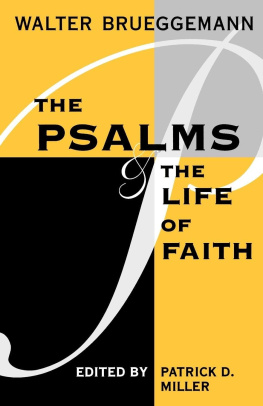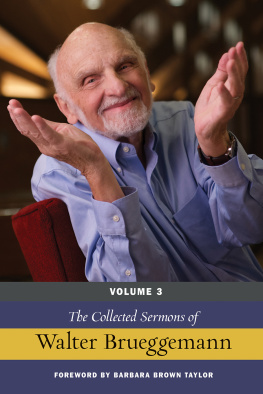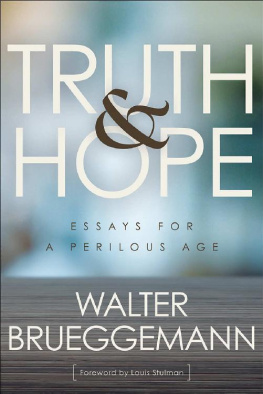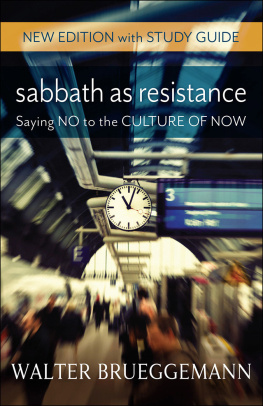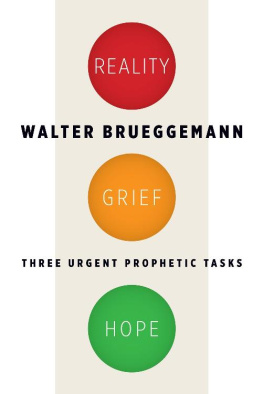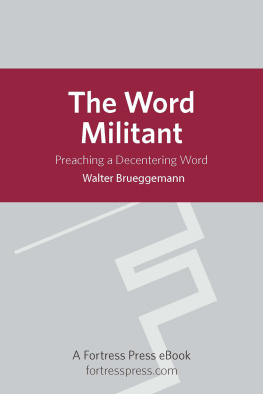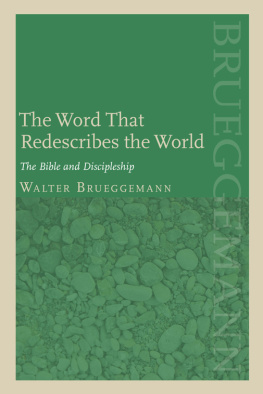Walter Brueggemann - Creative Word: Canon As a Model for Biblical Education
Here you can read online Walter Brueggemann - Creative Word: Canon As a Model for Biblical Education full text of the book (entire story) in english for free. Download pdf and epub, get meaning, cover and reviews about this ebook. year: 2011, genre: Religion. Description of the work, (preface) as well as reviews are available. Best literature library LitArk.com created for fans of good reading and offers a wide selection of genres:
Romance novel
Science fiction
Adventure
Detective
Science
History
Home and family
Prose
Art
Politics
Computer
Non-fiction
Religion
Business
Children
Humor
Choose a favorite category and find really read worthwhile books. Enjoy immersion in the world of imagination, feel the emotions of the characters or learn something new for yourself, make an fascinating discovery.
- Book:Creative Word: Canon As a Model for Biblical Education
- Author:
- Genre:
- Year:2011
- Rating:3 / 5
- Favourites:Add to favourites
- Your mark:
- 60
- 1
- 2
- 3
- 4
- 5
Creative Word: Canon As a Model for Biblical Education: summary, description and annotation
We offer to read an annotation, description, summary or preface (depends on what the author of the book "Creative Word: Canon As a Model for Biblical Education" wrote himself). If you haven't found the necessary information about the book — write in the comments, we will try to find it.
Walter Brueggemann: author's other books
Who wrote Creative Word: Canon As a Model for Biblical Education? Find out the surname, the name of the author of the book and a list of all author's works by series.
Creative Word: Canon As a Model for Biblical Education — read online for free the complete book (whole text) full work
Below is the text of the book, divided by pages. System saving the place of the last page read, allows you to conveniently read the book "Creative Word: Canon As a Model for Biblical Education" online for free, without having to search again every time where you left off. Put a bookmark, and you can go to the page where you finished reading at any time.
Font size:
Interval:
Bookmark:

The Land: Place as Gift, Promise, and Challenge in the Biblical Faith (1977)
The Prophetic Imagination (1978)
The Creative Word: Canon as a Model for Biblical Education (1982)
David's Truth in Israel's Imagination and Memory (1985)
Hopeful Imagination: Prophetic Voices in Exile (1986)
Israel's Praise: Doxology against Idolatry and Ideology (1988)
Finally Comes the Poet: Daring Speech for Proclamation (1989)
Interpretation and Obedience: From Faithful Reading to Faithful Living (1991)
Old Testament Theology: Essays on Structure, Theme, and Text (1992)
Texts under Negotiation: The Bible and Postmodern Imagination (1993)
A Social Reading of the Old Testament: Prophetic Approaches to Israel's Communal Life (1994)
The Psalms and the Life of Faith (1995)
The Threat of Life: Sermons on Pain, Power, and Weakness (1996)
WALTER BRUEGGEMANN
vii
I
This book seeks to make a statement at the interface between two disciplines: my own discipline of Old Testament study and the discipline of education. Such a book is possible only when two risks are taken, and I have taken both. First, it is necessary to be somewhat synthetic and sweeping about one's own discipline. I have tried to do that in judicious ways and intend not to be reductionist. Second, one must presuppose some things about the second discipline at the interface. I have made these presuppositions, which I hope are responsible, even if not fully informed.
The chapters of this book were prepared primarily for the Caldwell Lectures given at Louisville Presbyterian Theological Seminary in March 1981. Regarding that lectureship, I especially thank President Ellis Nelson and my host Craig Dykstra for their kind hospitality. Along the way, portions of this material were also given as the J. Clyde Wheeler lectures on ministry at Phillips University School of Religion and at Ewert College in Toronto. In those places as well, I was kindly hosted and graciously received, even if not uniformly agreed with.
This book has been long in the brooding stages. Initially the topic formed for me in response to an invitation from Larry Kalp of the United Church Christ. Near the end of the process my colleague, Ruby Schroeder, read the manuscript and provided helpful suggestions. Moreover, I have especially to thank several of my colleagues, my students for bearing with some exploration, and a host of friends who operate in the educational "network" of the church. Matty Ebersbach helped prepare the manuscript. And supremely, the two Marys in my life have been involved all along the way. My secretary, Mary Waters, presides over my special form of written communication. Mary, my wife, attends critically and supportively to hints that even fall short of that mode of writing. To finish the manuscript is to be grateful to them.
WALTER BRUEGGEMANN
Eden Theological Seminary
Every community that wants to last beyond a single generation must concern itself with education. Education has to do with the maintenance of a community through the generations. This maintenance must assure enough continuity of vision, value, and perception so that the community sustains its self-identity. At the same time, such maintenance must assure enough freedom and novelty so that the community can survive in and be pertinent to new circumstances.' Thus, education must attend both to processes of continuity and discontinuity in order to avoid fossilizing into irrelevance on the one hand, and relativizing into disappearance on the other hand.
The Old Testament mirrors a community that intended to last over the generations. Therefore the Old Testament had to be concerned with education. To be sure, this concern is not very often explicit in the text. But it is clearly a persistent and pervasive concern nonetheless, as the community struggled with continuity and discontinuity. And as the Old Testament itself seldom addressed education frontally, so Old Testament scholarship has seldom taken this concern as a useful entry into the text. Indeed, the secondary literature that considers these issues directly is surprisingly limited, surely to our disadvantage.
There are two reasons why I have decided to take up these issues. First, I suspect we are at a time when there may be an important interface between Scripture study and education in the church. Church education has been intensely interested in the social sciences and has indeed learned much from them. Nothing said here is meant to detract from the positive attention to learning theory, learning process, developmental psychology, and cultural anthropology which have greatly influenced the awareness of the church. In the next decade, critical sociology is likely also to have an important say. But in the midst of attention to the social sciences, I suggest that the biblical, theological disciplines have not been a full partner. The interface, therefore, has not been a very balanced one. Our concern here is to ask if Old Testament study can be a more effective partner in the dialogue about education, both constructively and critically. One can detect a move away from an uncritical embrace of the social sciences not only in education, but also in "pastoral care" and what we have come to call "organizational development."
Second, after some decades of confusion, it appears that current approaches to church education are relatively clearly defined. Most of these approaches can be linked to one or more prominent leaders in the field. The enterprise is thus divided into camps revolving around certain agendas and methods, or we may say, certain ways of putting the question. It is convenient for study to have things stabilized in this way, even to the making of an inventory. And indeed, Jack L. Seymour has helpfully offered such a summary list.' It includes:
1. Religious instruction approach, in continuity with the Sunday school movement (James Michael Lee).
2. Socialization and enculturalization (John Westerhoff).
3. Spiritual development, informed by developmental psychology (James Fowler).
4. Liberation, which is concerned with the mission of the community (Malcolm Warford).
5. Systems education, which attends to congregational formation (Robert Worley).
6. Interpretation praxis (Thomas Groome).
This may be a fair summary of where we are, though someone will no doubt be annoyed at being omitted from the list. But that still leaves the unanswered question of where we go next. I am proposing that an interface with Scripture study might contribute to the next steps we need to take as colleagues in a common ministry. That is the "external" reason for addressing the issue. And by "external" I mean simply a motivation that lies outside my own discipline of Old Testament study.
Font size:
Interval:
Bookmark:
Similar books «Creative Word: Canon As a Model for Biblical Education»
Look at similar books to Creative Word: Canon As a Model for Biblical Education. We have selected literature similar in name and meaning in the hope of providing readers with more options to find new, interesting, not yet read works.
Discussion, reviews of the book Creative Word: Canon As a Model for Biblical Education and just readers' own opinions. Leave your comments, write what you think about the work, its meaning or the main characters. Specify what exactly you liked and what you didn't like, and why you think so.

